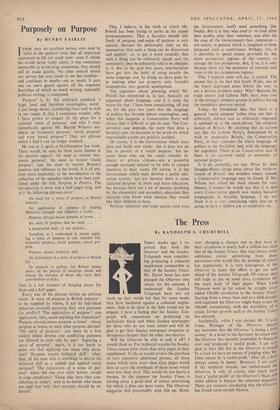No. 2 of a series about Oxfam's work at home
and abroad ■ 11
■
a a s ee The peace of the world in our children's lifetime is likely to depend on whether the have-not nations can advance with reasonable serenity towards modern living standards,'
THE ECONOMIST 25 JANUARY 1964
Oxfam recognises what is at stake. And although it doesn't have the resources to bring whole countries into the twentieth century, it can help many thousands of individuals in these countries to escape from hunger, poverty, ignorance and dis- ease.
Down to earth This link between the "haves" and "have-nots" is not a sentimental but a practical one. Oxfam takes the donations of the one to provide essentials for the other; food, drugs, fertilizer, tractors, livestock, irriga- tion, training—sensible, down-to- earth things that are desperately needed.
Last year Oxfam sent abroad £1,925,899 of aid to help "have-nots" in 72 countries. It all came from
OXFAM
c/o ROOM 72 BARCLAYS BANK LTD • OXFORD
If you really want to help, write out a cheque today (The new Annual Report is now ready)
ordinary people who cared enough to give. Each single gift made a difference to the life of someone, somewhere. Perhaps it meant a cup of milk; irrigation for a parched field; a home for a refugee; drugs for a mission hospital; a new plough; training for a farmer . . .
century migrants from Britain is described in fascinating detail.
More exclusively for students, though not en- tirely so, are L. C. B. Seaman's From Vienna to Versailles and Denys Hay's The Medieval Centuries (University Paperbacks, 7s. 6d. and 10s. 6d. respectively). The reader of the latter could usefully also peruse Medieval Technology and Social Change, by Lynn White Jr. (O.U.P., 7s. 6d.). Of specialist interest are Thucydides, by John H. Finley Jr. (Ann Arbor, 15s.), a com- prehensive exploration of the man, his times and his ideas, G. R. G. Mure's Aristotle (O.U.P., 10s.), an impeccable introduction to Aristotle's thought, Carl Joachim Friedrich's The Philo- sophy of Law in Historical Perspective (Phoenix Books, 14s.), which surveys the entire field of legal philosophy, R. M. Hare's The Language of Morals (O.U.P., 6s.), that glorious testament of linguistic analysis and probably the best work on ethics from post-war Oxford, and Richard Atwater's lucid translation of Procopius's Secret History (Ann Arbor, 12s. 6d.), a marvellous com- pendium of scandals designed to discredit J ustinian.
The Journal of Thomas More, edited by Peter Quennell, and Memoirs of the Due de Saint- Simon, edited by W. H. Lewis (Batsford, 12s. 6d. each), are full of those personal passions, in- trigues, contemporary urgencies and the authors' intelligence which make journals so consistently absorbing. Of wider appeal are Hadley Can- trill's The Psychology of Social Movements (John Wiley, 12s.), William Barrett's Irrational Man (Mercury Books, 12s. 6d.), a general study of existential philosophy, The Lotus and the Robot (Four Square, 5s.), Arthur Koestler's revealing account of Yoga and Zen, and Rayne Kruger's Goodbye Dolly Gray (Four Square, Ss.), an exciting narration of the Boer War.


































 Previous page
Previous page